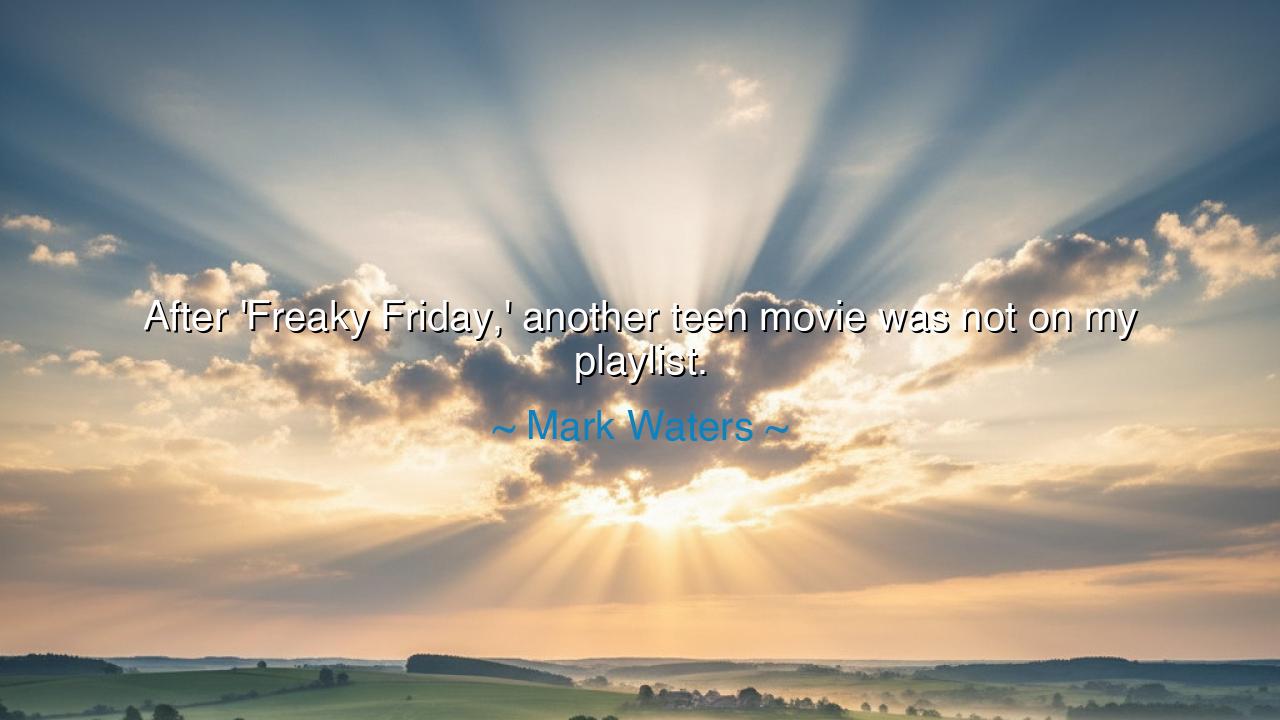
After 'Freaky Friday,' another teen movie was not on my






Mark Waters, the filmmaker whose hand shaped the beloved tale of Freaky Friday, once remarked: “After Freaky Friday, another teen movie was not on my playlist.” These words, simple in form, carry a deep current of meaning. They speak to the truth that even when one has achieved success in a certain field, the spirit often longs for new challenges and unexplored horizons. Waters had triumphed in the realm of the teen movie, yet his heart sought to move beyond repetition, to stretch his art into new shapes.
The origin of this statement lies in the creative journey of Waters himself. Freaky Friday was a story of generational conflict and understanding, framed through the magic of body-swapping. It captured the energy of youth, the humor of family life, and the reconciliation of differences. Yet after this work, Waters sensed that to linger too long in the same genre would be to confine his vision. Thus he declared that his playlist, the collection of paths open before him, would turn elsewhere. He honored the work he had done, but he also honored the call of artistic evolution.
The ancients too knew this impulse. The philosopher Aristotle taught that art imitates life, and since life is ever-changing, so too must the artist’s work evolve. To repeat endlessly the same themes is to stagnate, but to move forward into new forms is to grow in wisdom and mastery. Just as a warrior who has conquered one land sets his sights on another, so too does the artist, having scaled one mountain, yearn for the next. Waters’ refusal to remain in the comfort of teen movies reflects this timeless truth.
History also gives us the example of Beethoven. In his early career, he composed in the style of his teachers and predecessors, producing elegant works that satisfied the expectations of his time. Yet as he matured, he broke from these forms and sought new sounds, birthing the powerful symphonies that reshaped music forever. Had he confined himself to the familiar, his genius would have been dulled. Like Beethoven, Waters chose not to confine his craft to one niche, but to follow the higher call of growth and reinvention.
There is also a warning in Waters’ words: that success itself can be a trap. Many, after creating something beloved, are tempted to repeat the formula, clinging to safety. Yet the very pursuit of safety can erode the fire of creativity. To say “another teen movie was not on my playlist” is to declare independence from the chains of expectation, and to embrace the uncertainty of new journeys. It is the courage to say no to ease, and yes to risk.
The lesson for us is clear: do not remain too long in the comfort of what you have already mastered. Success in one domain is not the end of the path, but a preparation for greater challenges. Life demands movement, exploration, and courage. If you have triumphed in one field, do not let pride or fear of the unknown bind you there—seek new ground, for it is in the unknown that you continue to grow.
Practical wisdom follows. When you complete a project, a goal, or a season of your life, pause to give thanks for it—but do not let it be your cage. Ask yourself: what new fields call me? What untested skills lie within me? Like Waters, allow yourself to leave behind what is familiar, so that your story may not be a single note, but a symphony of many movements.
So, children of tomorrow, take this teaching to heart: honor the past, but do not be imprisoned by it. After one victory, seek another. After one story, write a new one. After one mountain, climb the next. For the measure of life is not in repeating what is safe, but in daring to evolve into what is greater. And this, as Mark Waters teaches, is the path of the true creator.






AAdministratorAdministrator
Welcome, honored guests. Please leave a comment, we will respond soon